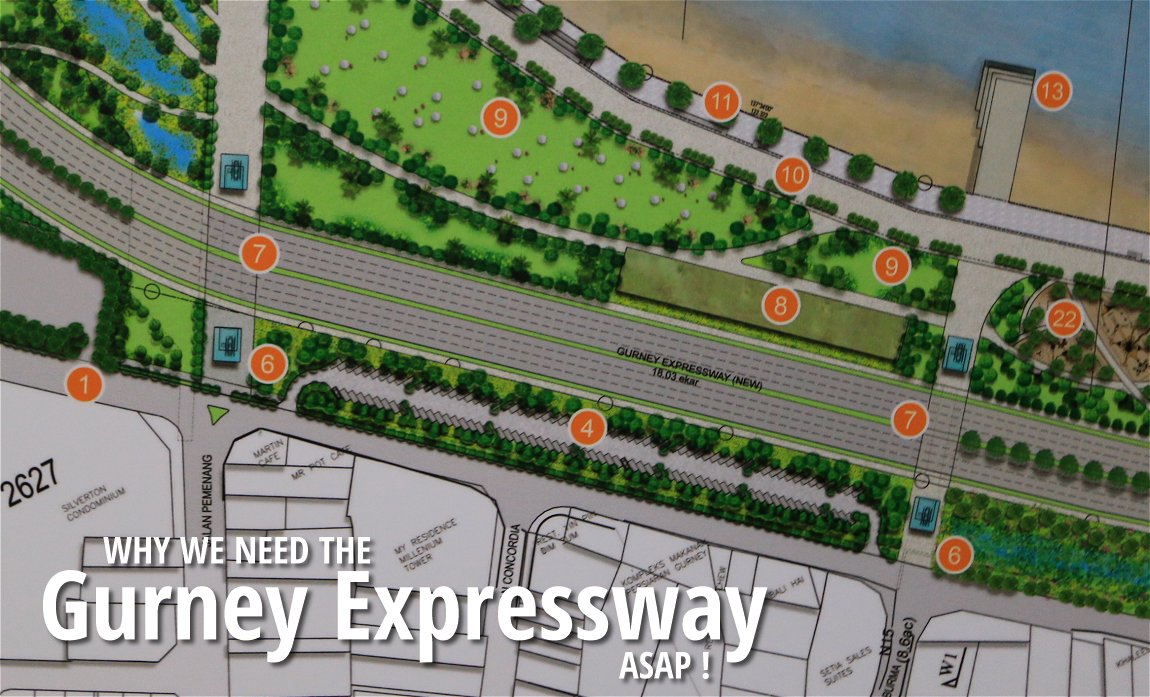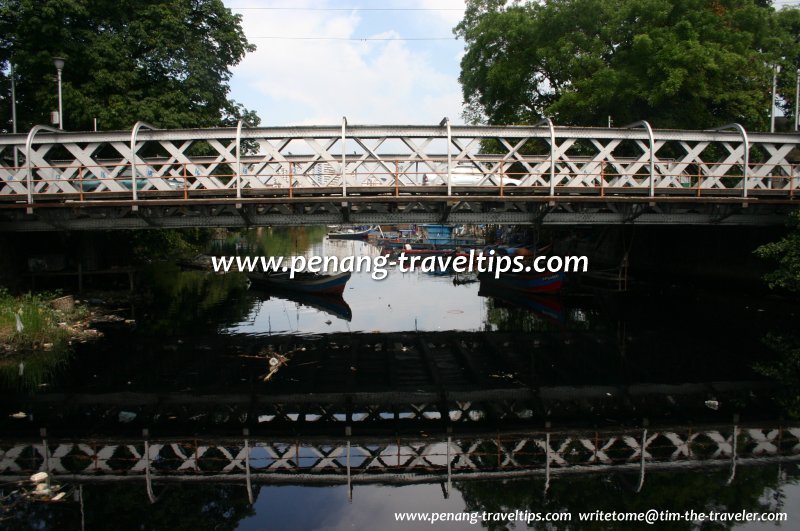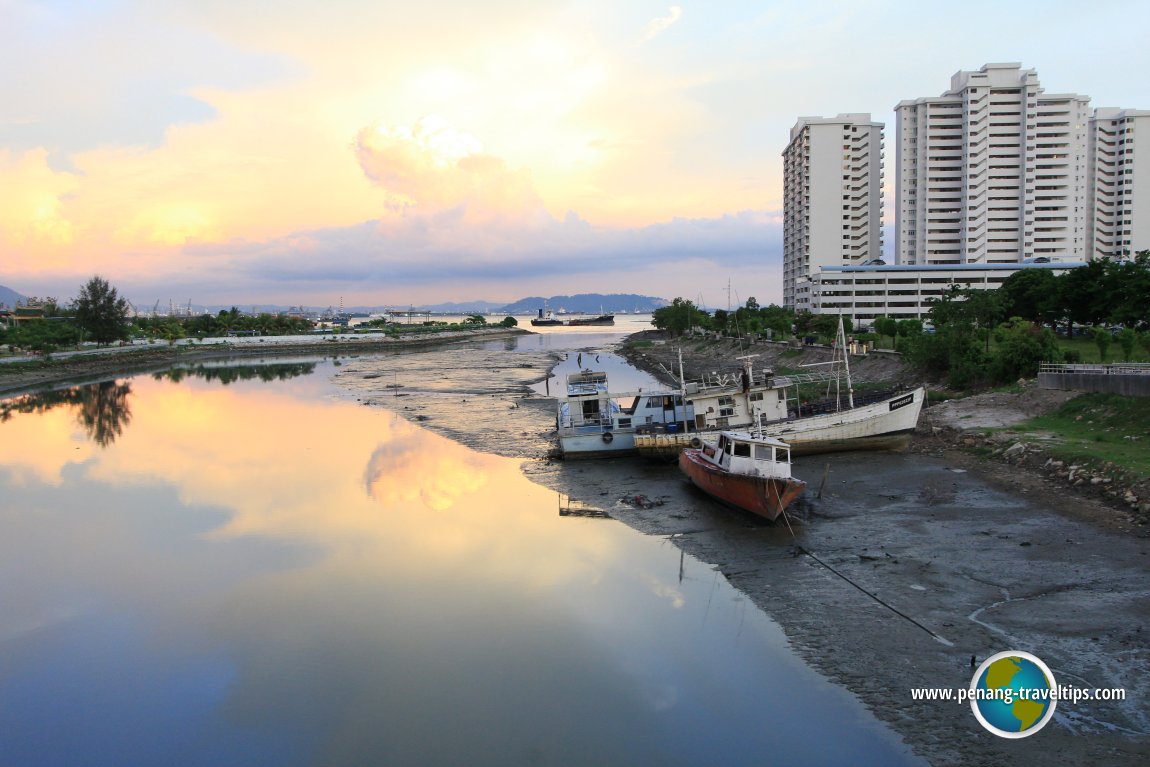 Why we need the Gurney Expressway asap! (24 February 2016)
Why we need the Gurney Expressway asap! (24 February 2016)
In case you didn't know, there's a new coastal highway in the works in Penang. Called Gurney Expressway, it will pass through the proposed coastal parkland, Gurney Wharf. The Gurney Expressway will make life so much easier for many people. Let me explain why so, and why we, the people of Penang, need ensure the Government build us this highway as soon as possible, or at the very least, stay within schedule.
About the Gurney Expressway
The Gurney Expressway is a coastal highway on the north coast of George Town. It will connect to the Penang Undersea Tunnel which is also in the works. At the interchange between the Gurney Expressway and the tunnel is another proposed highway linking them to the Tun Dr Lim Chong Eu Expressway (we will deal with that cross-city crossing in a separate, future article, when more details are released by the Government).Why we need the Gurney Expressway
In July, 2013, there was a revamp in the traffic flow for Pulau Tikus, with major roads such as Kelawei Road and Burmah Road being converted to one-way streets. In fact the announcement to implement the change dates back to 2010. Three years after the exercise, I believe most of you can agree with me that the roads in Pulau Tikus are just as congested. Traffic is at a crawl, particularly along Kelawei Road and Bagan Jermal Road. But before you point the finger of blame at the city council, I have to say that they have done as good a job as they could do, within the limitations set on them. Why is that so?Because there is just too many vehicles wanting to pass through Pulau Tikus. If you are in George Town, and you want to go to Tanjong Tokong, you'd pass through Pulau Tikus. If you're in Mount Erskine, and you need to go to Jelutong, you'd pass through Pulau Tikus. And so it is, anybody from anywhere wanting to go to the northern part of Penang Island need to pass through Pulau Tikus, and vice versa. Those vehicles have no intention of being on Kelawei Road or Burmah Road, but they are crammed into those roads because they happen to be along the way.
What we need is the means to remove the vehicles from the city roads of Pulau Tikus, and put them on an expressway, where they can reach their destination much faster, and not having to crawl through traffic. Think of the amount of fuel we burn needlessly, when we force vehicles to crawl through congestions daily. Not only is it money burnt, it also increases environmental pollution all along the congested roads.
The Gurney Expressway will help reduce that. Once it is built, and the Penang Undersea Tunnel along with it, you can travel from Alor Setar, Sungai Petani, Kepala Batas and Penaga (just to name a few) to Batu Ferringhi without having to pass through Pulau Tikus. You can travel from Tanjong Bungah to Weld Quay, Butterworth, and Bukit Mertajam bypassing Pulau Tikus. The only vehicles on the streets of Pulau Tikus are those that need to be in Pulau Tikus.
But wouldn't building more roads lead to more congestion?
It depends on what type of road we are talking about. If it is narrow city roads, probably. But to say that building more expressways lead to more congestion requires substantiation. How do people who say that support their argument? Personally, I consider it warped logic. Imagine a Penang without the Tun Dr Lim Chong Eu Expressway. Even if that expressway were to be closed for a day, there will be a massive gridlock on all the surrounding roads.Then why do new roads become congested so quickly?
It's something we should be thankful for: a robust economy. Often the pace of our economic growth outstrips the roads we build. Roads such as Burmah and Kelawei were built over a hundred years ago. The people who built them never imagine the amount of traffic we subject them today. Apart from widening existing roads, we haven't put any new major roads on the northern part of George Town in decades.We often travel to Western countries and remark that their city roads, especially those in the outskirts, are not as congested as roads in Penang. But we forget that they already have a developed network of expressways to ensure that only vehicles needing to be on those city roads are there. All too often, our city roads (roads like Kelawei Road and Burmah Road) have to play the role of the expressways. No wonder they are congested the whole time.
Without economic activities, our roads would be dead silent. The fact that there's vehicles on our roads means someone needs to go somewhere to do something. That something is worth doing here, in Penang, rather than elsewhere, is something to be grateful for!
Why do we use a road? Because we need to get somewhere, and that road offers us the convenience to reach where we are going. We don't use a road for the reason that it was built. When a new expressway is opened to the public, we might consider taking a joy ride to enjoy it for a while. But eventually the expressway reverts to its true purpose: taking people where they need to go.
If we are planning to visit our uncle in Kuala Lumpur, do we base our decision on the Government having built an expressway? Well, in this present age and time, unless the Government built a new-fangled expressway that it's worth the journey to see, most of us do not base our decision to go anywhere on a new expressway being opened. The expressway is there to serve a practical purpose: getting people where they need to go.
But instead of building another expressway, shouldn't we be improving our public transport instead?
I would never disagree to improving our public transport. But I would say that everything should go hand in hand, without one prioritized over the other.Let's face it: getting more people to take public transport, whether it is bus or LRT or monorail, is going to be a hard sell. Also, we need to remember that roads are not built just to move people. They are also built to move goods. The more productive Penang becomes - and we would appreciate a state that is productive - the more it needs roads to transport the goods. The public transport is for moving people: we won't appreciate having someone bring crates of material and chicken and ducks onto the bus or LRT, do we? If our road system is excellent, it will help support our local economy.
We need to provide people the option, whether to drive, or to take public transport. Having said that, I am not against making driving a privilege. In other words, if you want the convenience of driving, you should be willing to pay for that privilege. By making it more costly to go by car than by public transport, we encourage them to consider leaving their cars at home, using them only when necessary. But before we have that option to offer, we must first make our public transport par excellence, and our road infrastructure just as good.
But such an expressway will be damaging to the environment, wouldn't it?
Not necessarily so. I completely understand and completely welcome the concern of some that construction of the expressway may negatively impact our environment. It is good that people in Penang have such a concern today. It means we are gradually becoming a more educated, socially conscious society. I do not want to damage the environment around us any more than you do. However, I need to explain that the construction of vital infrastructure project will have minimal environmental impact, but in the long run help enhance the environment.The base of huge bridges and other submerged man-made objects often become artificial reefs teeming with marine life, when before that, the undersea area was barren. After the construction is done, the area is usually left alone, and nature is such that it will regenrate itself, colonizing the new seabed.
Destruction to natural habitat is often due not to infrastructure construction, but rather to the action of unscrupulous people - fishermen who overfish, people who dump toxic waste into the rivers and seas, resulting in our cockles and other shellfish becoming toxin laden, and picnickers who discard wrappers that do not degrade and get entangled with marine life - they are far more damaging than infrastructure construction.
Holding back development does not make us more pristine. Make a visit to Perak. Go to their small towns and take a look at the rivers there. You would think that, because these are small towns, their rivers would be pristine. Not so. Even in the small towns in Perak, you will find their rivers clogged with trash, often much worse than ours in Penang. Not only that. You will also find that many of the people living in the small towns of Perak are not very environmentally conscious. You will find rubbish scattered all over the roadside. Yet nobody reports on that, because all the environmentally conscious people are right here in Penang.
Now compare Perak to Singapore. Visit any of the rivers in Singapore, and you will find that they are all far cleaner than the rivers in Perak. And also cleaner than those in Penang. Go into the forest in Singapore, and you will find that they have well preserved their natural habitat. How is it possible that in Singapore, with all their development and so many expressways, far more than in Perak, are they better able to take care of their environment, compared to a state that is much less developed, with fewer expressways?
Here's the truth is: increasing the wealth of the population generally leads to improved environmental consciousness. Penang needs to be, and to remain, a place conducive for attracting well-educated people. We need the infrastructure so that high-earning jobs can be located here. People who are better educated, and more exposed to environmental debates, they are generally more unlikely to damage the environment. In Penang, while there's a small group of people who may have become environmentally conscious, the public at large, particularly those in the lower income bracket, are still not so environmentally conscious. But increased wealth leads to a society that is better educated, and hence more civicly conscious.
I don't wish to condemn people, but generally speaking, the poorer neighbourhoods in Penang tend to be dirtier. Go to a low-cost flat, and you see people stacking their unused belongings right to the corridors, often blocking passageways. Even furniture that they are no longer using are not discarded. For some reason, low-income people have difficulty letting go of things they don't use anymore. I'm not saying that there aren't neat and tidy people in low-cost neighbourhood, but walk around, and you see that they are severely outnumbered. You see someone throwing rubbish on the floor and you try to talk to them. And they say, "Put food on the table already a struggle and you are bothered of rubbish? Got cleaners mah, it's their job to clean up."
I realise that education does more than simply putting more money in people's pockets. It also does something to their whole way of thinking, making them more conscious of their surroundings, of being civic.
Construction of the Gurney Expressway (and the Undersea Tunnel) is the physical expression of development for Penang. It will enable the northern part of Seberang Perai, now presently a neglected region of Penang, to enjoy easier access to development. I like to remind people that the Chief Minister of Penang is not just the Chief Minister in George Town; he is also Chief Minister in Kepala Batas and Penaga. He has to look after everybody everywhere in Penang.
Compare our own Sungai Pinang in 2015, and how it was eleven years ago. Let me show you two photographs I took of this river in 20 March 2004 and 1 May, 2015.
 This is Sungai Pinang in 2004, when its water was ink black and has a strong stench to it (20 March 2004)
This is Sungai Pinang in 2004, when its water was ink black and has a strong stench to it (20 March 2004)
 Sungai Pinang in 2015 (1 May 2015)
Sungai Pinang in 2015 (1 May 2015)
You will see that in the 11 years, Sungai Pinang has indeed become cleaner today than it was 11 years ago. No, the work is not completed. Sungai Pinang still has some way to go before it can be declared pristine. But it has certain improved. As of now, even as the river is being cleaned up, there are still uncivic conscious people who continue to discard their trash into it. That's because there is still a segment of our society that is not properly educated over the environment. Changing people is a very gradual process. And it takes time to educate people, to reduce those who are uncivic conscious. But through improving the educational level and affluence of our society, we will slowly move in that direction.
Constructing the expressway allows us to preserve our competitiveness, and with our increased wealth, we are in a better position to protect our environment. A well-fed society has time (and funding) to consider less pressing issues, like the environment.
There is no greater fear than the fear of the unknown. But once we approach development with knowledge and sensitivity, it can be executed for the betterment of our society, and our society will become more affluent and more environmentally conscious. Once again, I share your concern for the environment, I do, but I would urge you to approach this matter without fear.
Why lessons can we gain from neighbours
The neighbour that looks most like us is Singapore. Also an island. Also densely populated. But Singapore decided decades ago to build expressways, and to make it a privilege for people to drive. We are too lenient and too lackadaisical. And as a result, we pay for that.But it's never too late to learn. Singapore's latest expressway, the Marina Coastal Expressway, offers useful lessons on how we too can built a world-class coastal expressway. Sometimes, all it takes is some humility to emulate others.
Conclusion
Once upon a time, we do not have the Tun Dr Lim Chong Eu Expressway. Now we can't do without it. We already need the Gurney Expressway, to do the job on the northern coast what the Tun Dr Lim Chong Eu Expressway is doing on our eastern shoreline. But we don't have it, so roads such as Kelawei and Burmah are playing double duty. It's almost impossible to cross these roads as pedestrians. More than anything, we need the Gurney Expressway to make neighbourhoods liveable again. And for those reasons, we need this expressway asap.Penang Transport Master Plan

Copyright © 2003-2025 Timothy Tye. All Rights Reserved.

 Go Back
Go Back